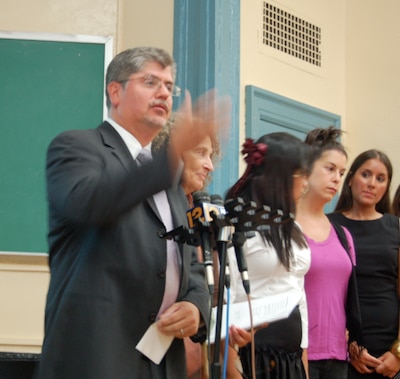
Many city schools rely on metal detectors, security guards, and zero-tolerance policies to keep discipline under control. They don’t have to, according to a new report about alternate strategies to keep schools safe.
The report, produced by the New York Civil Liberties Union and the Annenberg Institute for School Reform, highlights six city high schools that stop problems before they start, help students resolve their own disputes, and keep police out of all but the most serious incidents. The schools range in size and how students are admitted, but they all post higher-than-average graduation rates, the report says.
“There is no cookie-cutter solution” to replicating the gentler approach to discipline, said NYCLU policy director Udi Ofer at a press conference today. But he said getting rid of metal detectors, currently in place at about 130 city schools, is a good place to start. “Metal detectors do not make schools safer,” he said, adding that they create “flashpoints” for conflict between students and police officers. Such conflicts cause students to be arrested unnecessarily and undermine the authority of principals and teachers, the NYCLU has argued.
The number of police officers assigned to schools has increased in recent years, and the Department of Education also launched an initiative two years ago that surprises students with temporary metal detectors. Those strategies will not be dropped, according to a department spokeswoman, Margie Feinberg. “We wholeheartedly embrace discipline as an educational matter, but we will continue to use all tools available to us,” Feinberg said in a statement today. The city says major school crimes have fallen by nearly half since the mayor took office.
In its report, the NYCLU also argues that schools should treat fewer infractions as crimes; that fewer police officers should be assigned to schools; and that the city should make school safety data more available. “The additional recommendations cannot be successfully accomplished without first getting rid of the metal detectors,” Ofer told me.
A principal at the press conference, William Jusino of Progress High School in Brooklyn, told me that it takes hard work to create a positive culture around school safety. “Metal detectors are just one symbol, but symbols are important,” he said. “The removal of those negative symbols begins to let other folks know that you’re really concerned about the community that you serve.”
At Progress, students are involved in setting discipline policy, and administrators convinced the city to remove metal detectors more than a decade ago. But the city has been pushing for the detectors to return, Jusino said. “It’s a fight that we struggle with each and every year,” he said, adding that he and the other principals in the building have been threatened with firing if “something major” should happen on the campus, which was at one time the most dangerous in the city.
Here’s the NYCLU’s full report, titled “Safety with Dignity: Alternatives to the Over-Policing of Schools”:
